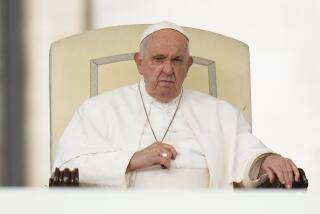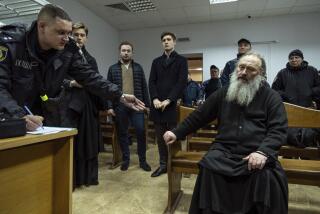Ukrainian Church Leader Told to Resign
MOSCOW — The synod of the Russian Orthodox Church on Thursday ordered the head of its Ukrainian branch to resign, describing him as a threat to church unity and warning that it would bring him to trial in an ecclesiastical court if he refuses.
The dramatic action to depose Metropolitan Filaret of Kiev brought into the open the virtual schism between the church’s Russian and Ukrainian branches as Kiev breaks away politically from Kremlin rule after nearly 350 years within first the czarist empire and then the Soviet Union.
Patriarch Alexi II, speaking after the special synod meeting at St. Daniil Monastery, almost choked with anger as he denounced Filaret in words that evoked the centuries of schisms within Christendom.
“The bishops of the Russian Orthodox Church were shocked by Metropolitan Filaret when--on arrival from Moscow after the bishops’ assembly where he twice gave his word as a prelate in front of the crucifix and the New Testament that he would retire--retracted his pledge,” Alexi said.
Filaret, 63, is now refusing to convene a regional bishops’ assembly at which he would resign, Alexi charged, although “he cannot now personify the unity of the Orthodox Church in Ukraine.”
In a formal resolution, the church synod declared that “Filaret is prohibited from acting as the head of the Ukrainian Orthodox Church prior to the bishops’ assembly (in Kiev, that he has not convened). . . .
“In the case of failure to fulfill the decision of the Russian Orthodox Church and the synod’s resolution, Metropolitan Filaret will be put on trial.”
Caught amid the drive for independence in Ukraine, the resurgence of the Ukrainian Catholic Church and the growing nationalism of Russians, Filaret had sought autonomy and then independence for the Russian Orthodox Church’s Ukrainian branch, which once boasted 37 million members.
Such a break, however, would be a great blow psychologically to the Russian church, which traces its 1,000-year history to origins in Kiev, and it was quickly entwined with the increasingly bitter rivalry between Russia and Ukraine as the two Slavic states struggle to work out a new relationship.
“There cannot be an independent state without an independent church,” Filaret commented as Ukraine began to exercise its new independence this year.
Filaret--politically conservative, clearly at ease with old-time Communist Party politicians and with a personal life that the Russian press suggests is scandalous--has become an increasingly controversial and divisive figure in Ukraine, particularly as he has pressed Alexi and the other leaders of the Russian Orthodox Church for ecclesiastical independence from Moscow.
In January, after Filaret declared the Ukrainian church’s autonomy, a step short of independence, three of his archbishops protested that the move was politically motivated, unwarranted and against the desire of church members. He removed all three from office, allegedly in violation of church rules, and thus provoked the current crisis.
At the bishops’ conference here a month ago, Filaret pressed his case for full independence--and instead was asked for his resignation.
On his return to Kiev, the Ukrainian capital, Filaret told a press conference, “I will not leave the church for which I am responsible before God.”
More to Read
Sign up for Essential California
The most important California stories and recommendations in your inbox every morning.
You may occasionally receive promotional content from the Los Angeles Times.










